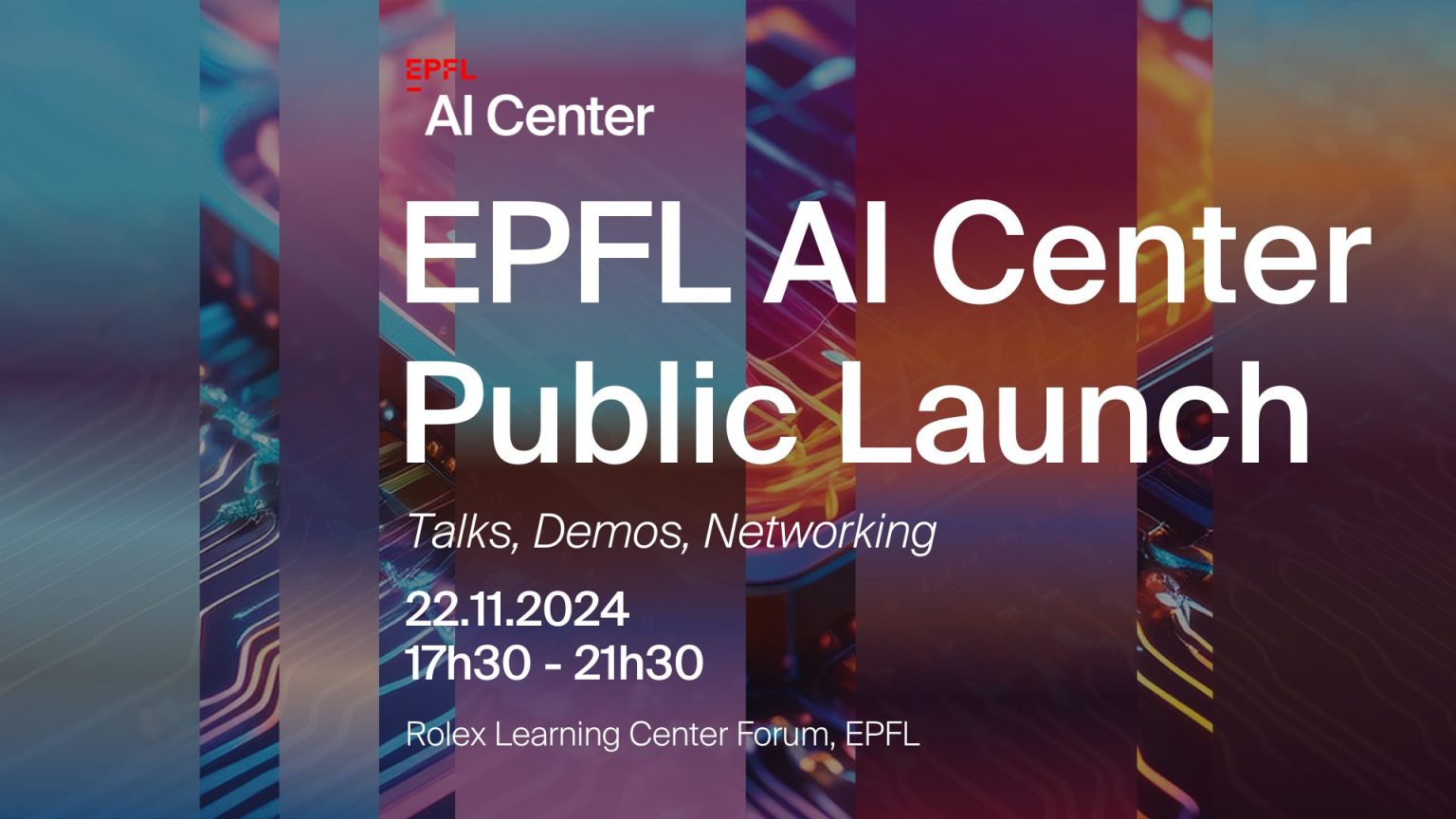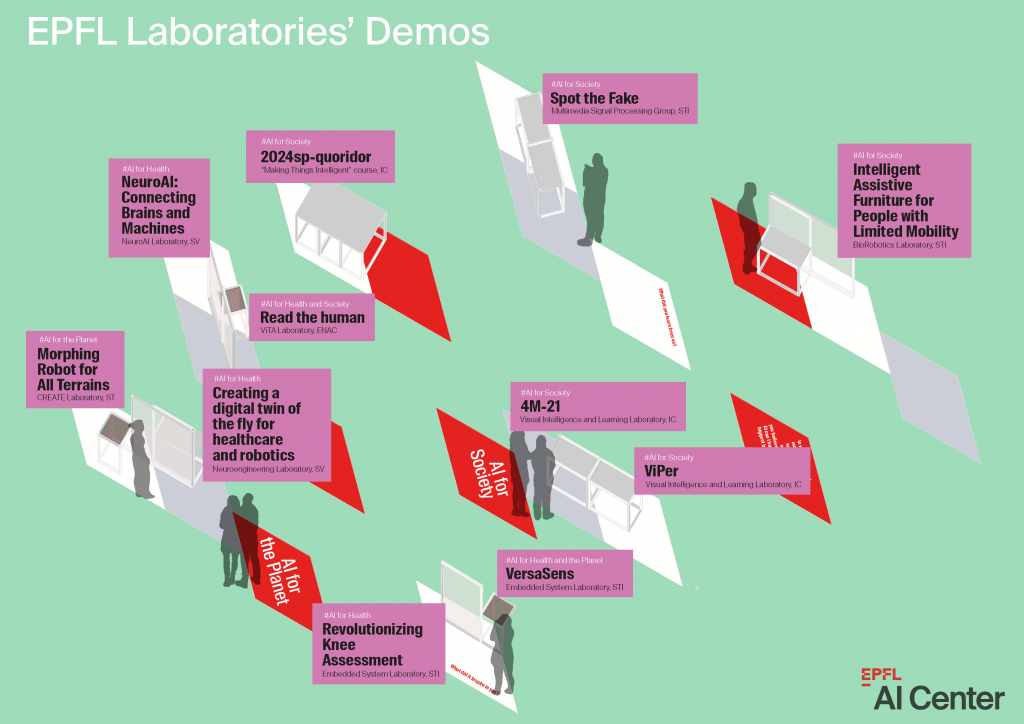AI: Shaping the Future

On behalf of the EPFL AI Center, I am delighted to invite you to our public launch event!
Our center prides itself for being a multidisciplinary hub where academic excellence meets real-world impact. We are committed to fostering collaboration across a diverse range of disciplines, bridging research from various faculties while actively engaging with industry, nonprofit organizations, government, and the wider AI community, both locally and beyond.
For this evening event, we have curated insightful talks and interactive sessions, all designed to spark new collaborations and inspire fresh perspectives on AI’s potential. Attendees will not only gain a deeper understanding of the transformative power of AI but also engage directly with the pioneers driving this change. Whether you’re here to network, learn, or collaborate, this event offers something for everyone.
Looking forward to seeing you there!

Scarlet Schwiderski-Grosche
Executive Director of EPFL AI Center
Program |
|
|---|---|
|
16:45 |
Check-in |
|
|
PART I |
|
17:45 |
Welcome address by Scarlet Schwiderski-Grosche, EPFL AI Center Executive Director |
|
18:00 |
Speech by Martin Vetterli, President of EPFL |
|
18:10 |
Intelligent Models to Treat Cancer Keynote by Jasmin Fisher, UCL Cancer Institute Followed by Q&A |
|
PART II EPFL Faculty Lightning Talks: AI Applications in Science, Health, Robotics, and Sustainability |
|
|
18:45 |
Foundation Models for Animal Behavior Talk by Mackenzie Mathis Followed by Q&A |
|
19:00 |
Tangible AI: Interactive and Intuitive Reconfigurable Robots Talk by Jamie Paik Followed by Q&A |
|
19:15 |
AI as a Key Enabler for Sustainable Cloud Computing Talk by David Atienza Followed by Q&A |
|
19:30 |
Fighting Fire with Fire: Scaling AI Research to meet the Scale of AI Talk by Antoine Bosselut Followed by Q&A |
|
19:45 |
Closing Demos, Networking & Apéro Riche! |
List of demos

| Alexandre Alahi | Read the human | AI for Health & Society | Visual Intelligence for Transportation (VITA), ENAC |
| Amir Zamir | 4M-21 & ViPer – Vision foundation model | AI for Society | Visual Intelligence and Learning Laboratory (VILAB), IC |
| Auke Ijspeert | Intelligent Assistive Furniture for People with Limited Mobility | AI for Society | Biorobotics Laboratory (BioRob), STI |
| Christoph Koch | 2024sp-Quoridor game robot | AI for Society | Data Analysis Theory and Applications Laborator (DATA), IC |
| David Atienza | Multimodal Edge-AI Wearables | AI for Health | Embedded Systems Laboratory (ESL), STI |
| Josie Hughes | Morphing Robot for All Terrains | AI for the Planet | CREATE Lab, STI |
| Martin Schrimpf | NeuroAI: Connecting Brains and Machines | AI for Health | EPFL NeuroAI Lab, SV |
| Pavan Ramdya | Creating a digital twin of the fly for healthcare and robotics | AI for Health | Neuroengineering Laboratory Latest research, SV |
| Touradj Ebrahimi | Deepfake literacy – Spot the Fake | AI for Society | Multimedia Signal Processing Group (MMSPG), STI |
Speakers

Prof. Jasmin Fischer
Computational models, analysis techniques to study cancer evolution and mechanisms of drug resistance
Jasmin Fisher is Professor of Computational Biology at University College London Cancer Institute. She received her PhD in Neuroimmunology from the Weizmann Institute of Science in 2003. She then started her pioneering work on the application of formal verification methods to analyse executable mechanistic models of cellular processes as a postdoctoral fellow at the EPFL in Switzerland.
In 2007 Jasmin joined the Microsoft Research Lab in Cambridge where she was a Principal Researcher until 2019. In 2012 she was also appointed as an Associate Professor in the Department of Biochemistry at the University of Cambridge. In 2019, Jasmin relocated her lab to the UCL Cancer Institute. Her research group develops state-of-the-art computational models and analysis techniques to study cancer evolution and mechanisms of therapy resistance to identify better personalised treatments for cancer patients. Her studies, in partnership with clinicians, pharma and biotech companies have led to the identification of new combination therapies that increase efficacy and overcome treatment resistance for different cancer types, paving the way for improved patient outcomes. In 2017 Jasmin was named one of the Top Outstanding Female Leaders in the UK Healthcare and was elected Fellow of the Royal Society of Biology in 2018.
Prof. Mackenzie Mathis
Systems Neuroscience, Animal Behavior & Computer Vision
Mackenzie Mathis is the Bertarelli Foundation Chair of Integrative Neuroscience at the Brain Mind Institute, and an assistant professor at EPFL, since 2020 after moving her lab from Harvard University where she held the Rowland Fellowship.
She leads the Mathis Laboratory of Adaptive Intelligence, working at the intersection of systems Neuroscience, animal behavior, and computer vision. She develops mouse models of motor adaptation and creates new quantitative approaches to studying behavior and neural circuits.
She is a Scholar at the European Lab for Learning and Intelligent Systems (ELLIS) at EPFL. She has received numerous grants and awards, including the FENS EJN Young Investigator Prize in 2022, the Eric Kandel Young Neuroscientist Prize in 2023 (together with Alexander Mathis, co-developer of DeepLabCut), and most recently, the Swiss Science Prize Latsis in 2024.


Prof. Antoine Bosselut
Natural Language Processing (NLP), Artificial Intelligence (AI), Machine Learning (ML)
Antoine Bosselut is an assistant professor in the School of Computer and Communication Sciences at EPFL, where he leads the Natural Language Processing (NLP) lab, which conducts research on natural language processing (NLP) systems that can model, represent, and reason about human and world knowledge. Previously, he was a postdoctoral fellow at Stanford University and a Young Investigator at the Allen Institute for AI (AI2). He received his PhD at the University of Washington in 2020. He was named as a Forbes 30 under 30 for Science and Healthcare in Europe (2021). His research focuses on building knowledge-aware NLP systems, specializing in commonsense representation and reasoning. He was named as one of the Forbes 30 under 30 list for Science and Healthcare in 2021.
Prof. Jamie Paik
Soft robotics Origami robots Wearable technologies Novel robotic and actuator design
Jamie Paik is Associate Professor, founder and director of the Reconfigurable Robotics Lab (RRL) at EPFL. Her work pushes the boundaries of human-machine interaction, with applications in healthcare, space exploration, and consumer electronics.
RRL’s research focuses on modular, adaptable, and soft robotics. Her lab focuses on the design, actuation, fabrication, and control of unique robotic systems, leading to the development of soft, reconfigurable, and interactive robots that are highly responsive to their environment.
RRL is an internationally collaborative lab, engaging with leading institutions and industry partners across the U.S., Europe, and Asia.
Jamie Paik frequently presents at world-leading conferences such as TED, UN Summit, GITEX Global, and ICRA.


Prof. David Atienza
Design methodologies for energy-efficient HPC and edge-Al computing for IoT
David Atienza Alonso is a professor of Electrical and Computer Engineering and the Head of the Embedded Systems Laboratory (ESL) in EPFL the School of Engineering. He received his MSc and Ph.D. degrees in computer science and engineering from UCM, Spain, and IMEC, Belgium, in 2001 and 2005, respectively. His research interests include system-level design methodologies for high-performance multi-processor system-on-chip (MPSoC) and low-power Internet-of-Things (IoT) systems, including ultra-low power edge AI architectures, smart embedded systems, and network-on-chip design.
He has co-authored more than 400 papers, three books, and 14 licensed patents in these areas. He has also received several recognitions and awards, including the ICCAD 10-Year Retrospective Most Influential Paper Award in 2020, and the 2024 Test-of-Time Award the ACM/IEEE, and he is currently the Chair of the European Design Automation Association (EDAA). He is a Fellow of both IEEE and ACM, and he has recently been named Editor-in-Chief of the journal Computing Surveys (CSUR) of the Association for Computing Machinery (ACM).
Venue
EPFL Rolex Learning Center Forum
Built on the EPFL campus, The Rolex Learning Center functions as a laboratory for learning, a library and an international cultural hub for EPFL, open to both students and the public.
Organizing committee
Deirdre Rochat, Nicolas Machado, Laura Ferrarello, Melissa Anchisi
Practical information
- Getting to EPFL
- Cloakroom
- Contact: For any questions regarding the event you can contact epflai@epfl.ch
EPFL & UNIL “Journée de l’intelligence artificielle”
Following our launch event, the “Journée de l’intelligence artificielle” will open the EPFL campus to the general public with AI talks, conferences, and interactive demos. This event is co-organized by EPFL, UNIL and the EPFL AI Center.
For more information visit the event page.
